Sales of more U.S. weapons to Saudi Arabia may portend more chaos in the Middle East but President Trump justifies the move with his rhetoric about “jobs, jobs, jobs,” as Trita Parsi explained at Middle East Eye.
By Trita Parsi
President Donald Trump’s visit to the Middle East has turned out as expected: no single act of outreach to the Muslim world could undo his fueling of Islamophobia and no amount of Iranophobia could cover up the irony of Trump and Saudi Arabia uniting against intolerance.
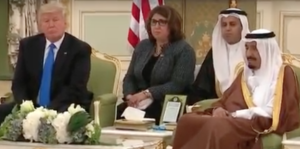
President Trump takes part in ceremony for signing agreement on weapons sales in Saudi Arabia, May 20, 2017, with King Salman at right. (Screen shot from Whitehouse.gov)
It is clear what Trump wanted from the trip: massive arms sales and Saudi investments in the U.S. economy. But it is less clear why Saudi Arabia and Israel once again depict Iran as an existential threat even after Tehran’s nuclear program has been checked.
The answer lies not in Iran’s regional policy, but Israel and Saudi Arabia’s wish for the U.S. to re-establish hard, American hegemony in the Middle East. That is, for the United States to lead and underwrite the Herculean task of sorting out the chaos in the region. In short: Saudi and Israel first.
A key factor explaining the violence in the Middle East in the past few decades is that the region has lacked a sustainable, indigenous order. The process of establishing an order is by definition disruptive and the Middle East has almost continuously been in this state since the end of the Cold War.
To make matters worse, the temporary equilibriums that briefly provided a resemblance of order were established and sustained by an external power – the United States – rather than by the states of the region themselves. As a result, these temporary periods of stability could only last as long as the external power was willing to sustain the order with its own blood and treasure.
Pursuing Hegemony
This was certainly the case with Washington’s Dual Containment policy in the mid-1990s. After the end of the Cold War, the United States had the option of establishing a new, inclusive security architecture for the region. Instead, it opted to pursue an order centered on Israel, Egypt and Saudi Arabia while keeping Iran and Iraq in continued isolation.
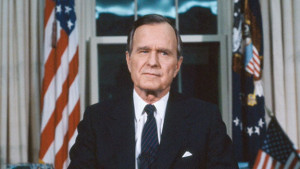
President George H. W. Bush addresses the nation on Jan. 16,1991, to discuss the launch of Operation Desert Storm.
Not surprisingly, Iran emerged as the main opponent to the American order as it viewed itself as a regional power that should help lead the region rather than be excluded from its security and political structures.
Iran calculated that the weakest link in the American strategy was the Israeli-Palestinian peace process. If the peace process failed, so would Washington’s efforts to establish an order based on Iran’s prolonged isolation. Iran began to heavily support Palestinian rejectionist groups who used terror against Israel in the hope of collapsing the peace negotiations.
As the U.S. sought to isolate and contain Iran, and thwart its efforts to challenge the U.S.-led order, Washington began portraying Iran as the number one threat to the region’s security, categorizing it as a pariah and rogue state.
“Wherever you look, you find the evil hand of Iran in this region,” Secretary of State Warren Christopher said in March 1995, essentially blaming all of the region’s woes on Tehran.
All-out isolation of Iran could not be achieved unless the broader international community began viewing the clerical regime as a rogue actor, which in turn necessitated them buying into the American and Israeli line that Iran was the root cause of all of the region’s ills.
Isolate Iran, Part II
Today, even prior to the visit to Saudi Arabia, Trump’s Defense Secretary Jim Mattis had begun echoing Warren Christopher’s rhetoric on Iran.
“Everywhere you look if there is trouble in the region, you find Iran,” Mattis told reporters in Riyadh last week.
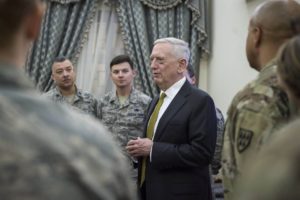
Defense Secretary Jim Mattis meets with troops stationed at Al Udeid Air Base, Qatar, April 21, 2017. (DoD photo by Air Force Tech. Sgt. Brigitte N. Brantley)
Just as Christopher and the Clinton administration’s approach towards Iran in the 1990s was heavily influenced by Israel, Mattis and the Trump administration appear to be heavily colored – if not directed – by Saudi Arabia.
Washington’s talking points on Yemen are now mirror images of Riyadh’s: the Houthi rebels in Yemen are Iranian proxies rather than independent Yemeni actors, the Yemeni civil war is the result of Iranian meddling rather than the result of a power struggle between various Yemeni factions, and the defeat of the Houthis is necessary to prevent “Iranian hegemony” in the region.
Mattis has even repeated the blatantly false assertion that the only country the Islamic State (ISIS) group hasn’t attacked is Iran.
“I consider ISIS nothing more than an excuse for Iran to continue its mischief,” Mattis said in 2015. “Iran is not an enemy of ISIS; they have a lot to gain from the turmoil that ISIS creates…. I would just point out one question for you to look into. What is the one country in the Middle East that has not been attacked by ISIS? One. That is Iran. That is more than happenstance, I’m sure.”
In reality, not only has ISIS tried (and failed) to attack Iran, Tehran played a critical role in preventing ISIS from capturing Baghdad in 2014, according to Iraqi officials.
Music to Saudi and Israeli ears
Moreover, the Trump administration’s rhetoric increasingly paints Iran – and not ISIS – as the main threat in the region. Some supporters of the Trump administration have long played down the threat from ISIS, arguing that ISIS is a short-term problem, while Iran poses a longer-term challenge precisely because of its opposition to American hegemony.
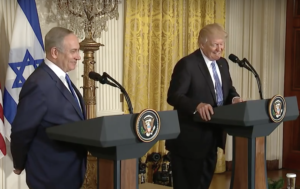
President Donald Trump and Israeli Prime Minister Benjamin Netanyahu at joint press conference on Feb. 15. 2017. (Screen shot from Whitehouse.gov)
This flip-flop echoes the line taken by Israel (and even some GCC countries) ever since the rise of ISIS. Israel is not threatened by Islamic State and Iran is a larger threat to the Jewish state, Israel’s Defense Minister Moshe Yaalon said in November 2015. The West’s excessive focus on ISIS is benefiting Iran, Israel maintains, and gives Tehran an opportunity to portray itself as an ally of the West while in reality it continues to destabilize the region.
But just as Washington’s depiction of Iran as the culprit behind regional instability was widely exaggerated in the 1990s and aimed at masking U.S. frustration with Iranian opposition to the specific regional order Washington preferred, Trump’s desire to blame Iran for the region’s instability and suggest that Iran has a tacit alliance with ISIS is equally – if not more – questionable.
Not because Iran is a constructive player in the Middle East (arguably, only Oman qualifies for that title) or because it hasn’t contributed to the region’s conflicts, but because putting all the blame at the feet of Tehran is simply too convenient.
It is, however, music to Saudi and Israeli ears. Trump dusting off Christopher’s talking points on Iran signals that he’s acquiescing to Saudi and Israeli demands to re-establish American hegemony in the Middle East and revert back to a policy of seeking Iran’s complete isolation.
“Until the Iranian regime is willing to be a partner for peace, all nations of conscience must work together to isolate it,” Trump said in Riyadh.
Questionable Alliance
For the Saudis, this is more important than scrapping the nuclear deal because in reality it targets the very core of that agreement. The nuclear deal aimed to resolve the nuclear dispute with Iran in order to pave the way for a new, inclusive regional security dialogue – one that would include Iran. It signaled an end to hard American hegemony and the policy of Iranian isolation. A nightmare, in short, for the Saudis.
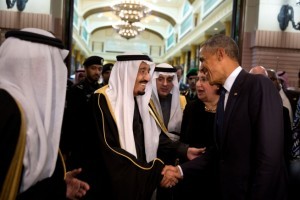
Saudi King Salman bids farewell to President Barack Obama at Erga Palace after a state visit to Saudi Arabia on Jan. 27, 2015. (Official White House Photo by Pete Souza)
But while it is understandable that some American allies prefer that the U.S. pays for the security of the region with its blood and treasure, few in Washington ask whether this policy benefits America.
Clearly, the Middle East – with its vast energy resources – has been a strategic region for decades. And while the region had strong states, maintaining a balance of power was not too costly. But today, the value of hegemony in the region is questionable. The energy resources are less valuable. And the cost of security has skyrocketed as a result of the collapse of states and societies in the region. On top of that, no state or movement in the region is in a position to challenge the U.S. global position.
Bottom line is: the cost-benefit analysis of hegemony in the Middle East no longer holds up. But Trump doesn’t seem to care. As long as he gets the arms sales, he seems indifferent to the cost this questionable alliance with Saudi Arabia will impose on the U.S. in the long run.
It’s an aspect of the art of the deal only he seems to understand and very few question.
Trita Parsi is the president of the National Iranian American Council and author of the forthcoming book, Losing an Enemy – Obama, Iran and the Triumph of Diplomacy (Yale University Press, 2017). [This article originally appeared at MiddleEastEye at http://www.middleeasteye.net/columns/trump-middle-east-america-first-saudi-and-israel-first-741308402.]

Iran has its tons of nuclear waste that it has been transforming into uranium-based weapons. The typical bunker buster has a ton of uranium (depleted or undepleted — what the Israelis dropped on Lebanon in August 2006 was low enriched, according to the analyses of the United Nations Environment Program), which burns at as much as 6,000°C. What’s left is a ton of microscopic radioactive powder, good for up to 22 billion — yes, BILLION — years. If Iran can hit Israel, it can contaminate it permanently. It’s a very low-cost alternative to a nuclear arsenal and can be just as effective a deterrent. So, the questions now are: what missiles do the Iranians have to deliver them, and how good is the Israeli antimissile system?
Do you have any references for this hypothetical nuclear weapon?
The development of unraium-based warheads goes back to the nineteen eighties. As stated, they were used in southern Lebanon, as testified by both the UNEP and independent researchers. They were first tested in war in the bombing of Baghdad in 1991. There was further elaborate testing in Afghanistan, especially in Tora Bora (http://www.rawa.org/du.htm ). Since then, they have been used all over the Near and Middle East. That Iran is building them goes without saying, for there is NO monitoring of the nuclear waste from the enrichment program (it is absent from the nuclear agreement), and it has, according to Iranian security analysts, “disappreared”.
Further, it is NOT a nuclear weapon, for it involves neither fusion nor fission. It is, de facto, a radiological weapon; however, under international arms control conventional law, it is, de jure, not a radiological weapon because this category was defined according to INTENTION, to wit spreading radioactive material. While this may or may not be the intention of their current use, it is the result.
An Iranian bombing of Israel with such weapons would permanently contaminate the areas hit. The threat of this is a deterrent to Israel. Israel’s only hope to wipe out this deterrent would be to hit EVERYTHING in Iran simultaneously. This Israel could never do without huge United States support since their own air force is not big enough.
And what idiocy brought Trump to take on an old neocon veteran of the Iraq war such as Mattis when he claimed not to want war? I totally agree with Realist, getting something going, a movement worldwide for condemnation of this country in which we are subjects, truly the “Evil Empire”, has got to be undertaken to stop the beast of the USA in its maniacal hegemonic pursuit.
Mattis has also failed to recommend that the Central Command leader and his air commander should be relieved of command and tried for treason for the Sept 2016 attack on Deir Ezzor. This scuttled the peace deal Kerry had reached with Lavrov in Syria. We simply can not have generals on their own starting hostilities. Mattis has completely failed in his duty to Trump and the American people.
When is the United Nations going to do the right thing and sanction the United States for being the arms merchant of the world, making possible all the death and destruction currently ongoing around the globe. The practical consequences of America seeding the means of mass murder to every bellicose faction expressing disdain for Russia, China or Iran have been much graver than any wish Iran may have fleetingly had to possess a nuke or the possible (but not proven) scenario that North Korea may actually have a handful of such devices. Of course, my question is only rhetorical, the answer being when hell freezes over. Is radical climate change possible down there?
That is, for the United States to lead and underwrite the Herculean task of sorting out the chaos in the region. In short: Saudi and Israel first.
This Gordian knot will be cut when Iran gets the bomb.
Unless they bought a handful of Soviet nukes when the USSR disintegrated, or pay the North Koreans for a few, Iran isn’t going to to get a bomb. The former case would amount to single digit numbers of tiny ones, and the latter one is simply too risky. Anyhow, it’s increasingly understood that for most purposes the things are vastly overrated. A 5-gallon bucket full of high explosive sitting squarely on your hardened target is much more efficient than a megaton nuke going off a mile away. Cheaper and safer, too.
Mattis simply cannot be this stupid, so it comes down to dishonesty and/or fanaticism. I wondered why I hadn’t heard of this particular bit of numbskullery, and my search of Google News verified that it wasn’t reported by any of the “mainstream media”. That’s their style – keep us in the dark and feed us BS fantasies about the evil Russians or latest doings of the exciting Kardashians.
What on earth does Saudi Arabia plan to do with its shiny new weapons? Are US neocons and Holy Israel in cahoots to use the Saudis to smash as much of Iran as possible? Is Yemen just a warm-up for that? I wonder if we’re due for a False Flag attack in S.A. which everybody will instantly pin on Iran.
Zachary, ISIS never actually attacked any other country that was independent and stable within itself. All the countries where ISIS have been active have already been deliberately undermined by America and her vassal states in Europe. In fact the ISIS mob are an arm of the America military. America, Britain and EU countries together with Israel are training, arming and financing terrorists at this very moment in Syria and elsewhere. We British currently have advisers in Saudi Arabia helping Saudi troops on how best to murder women and children in Yemen, whilst the Yanks re-fuel Saudi war planes in flight so they don’t have to waste time going back to base. ISIS like the ludicrous ‘white helmets’ is an invention of the West designed specifically to destroy every middle East country not under the rule of the USA.
ISIS is a Sunni group that grew from disenfranchisement of the Sunni minority (about 20%) in Iraq, after the US proxies there denied participation in government to them. Iran is a primarily Shiite country, which became influential in Iraq after the US invasion, and had ties to Shiite militias there that stabilized the Iraq government. The Iranian IRG is still a primary ally of Iraq in opposing ISIS. Its own forces largely fled as ISIS took territory, opposed primarily even now by Iraqi Kurds, who seek independence from Iraq.
For a US top official to think that ISIS is tied to Iran shows extreme ignorance of the region at the highest level.
“But today, the value of hegemony in the region is questionable. The energy resources are less valuable.”
While that is true, the continued valuation of oil in dollars and recirculating the dollars in the U.S. is critically important to maintain U.S. domination. In an effort to strengthen their independence and weaken the dollar, Russia and China are already conducting their trade in their own currencies and are building alternatives to the Swift system, World Bank and IMF. This is a threat to the dollar and the U.S. deep state will not allow it to happen. Gaddafi posed no threat to the U.S. or his own citizens but the CIA created a fake opposition to justify overthrowing him and turning the country into a failed state. Gaddafi’s crime was planning a pan African currency to challenge the dollar. If the Saudis started using another currency to sell oil it would be the beginning of the end of the domination of the dollar, financial crisis for the U.S. and possible a more peaceful world.
Come on Pillar, Trump doesn’t have a clue about foreign policy, global strategy, or any of the basic issues of global economics, regional histories and ethnicities, etc. that a really together chief executive should have. He gets his “knowledge’ from Fox News for God’s sake! Don’t be so polite to this ignoramus who is out to do as much damage to our world that he can with his stupid decisions.